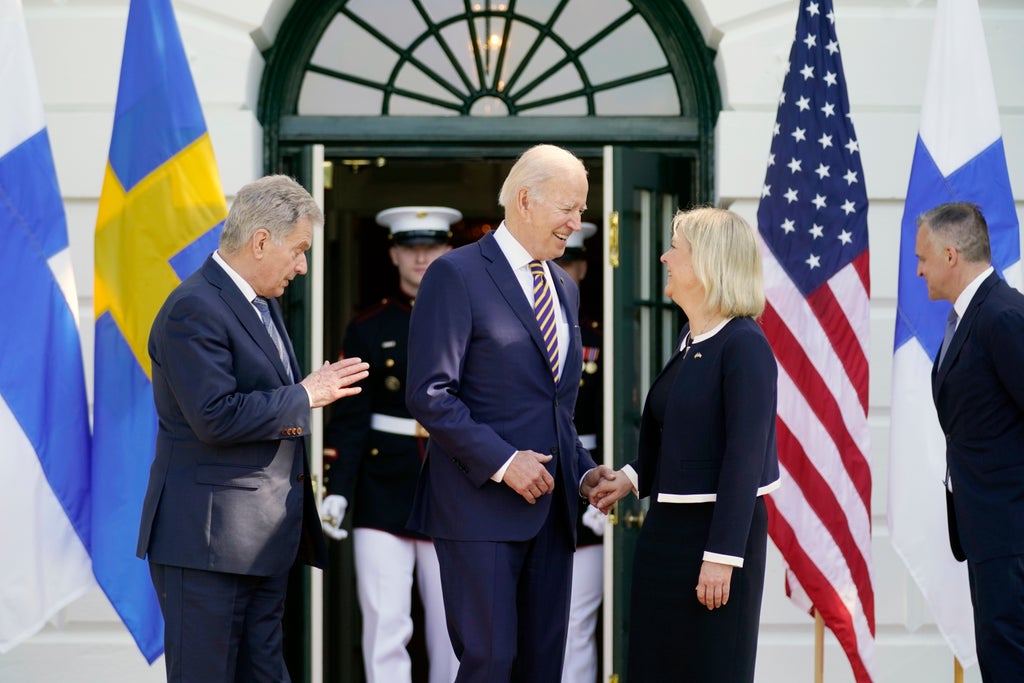
President Joe Biden on Thursday welcomed the leaders of Sweden and Finland to the White House, as he hailed the application of the once-neutral countries to join the North Atlantic Treaty Organization in response to Russia's invasion of Ukraine.
Biden greeted Prime Minister Magdalena Andersson of Sweden and President Sauli Niinistö of Finland at the White House with handshakes and laughter as they met for trilateral conversations on the NATO mutual defense pact as well as broader European security concerns. His administration has professed optimism for their applications to join the alliance, which would mark a significant embarrassment to Russia, despite continued opposition from Turkey.
“I think we’re going to be okay,” Biden said Wednesday when asked whether he was confident he could secure their entry into NATO.
Russian President Vladimir Putin has demanded that the alliance stop expanding toward Russia’s borders, and several NATO allies, led by the United States and Britain, have signaled that they stand ready to provide security support to Finland and Sweden should the Kremlin try to provoke or destabilize them during the time it takes to become full members.
While neutral throughout the Cold War, Finland and Sweden now cooperate closely with NATO. The countries will only benefit from NATO’s Article 5 security guarantee — the part of the alliance’s founding treaty that pledges that any attack on one member would be considered an attack on them all — once the membership ratification process is concluded. Public opinion in Finland and Sweden has shifted massively in favor of membership since Russia invaded Ukraine on Feb. 24.
Because the pact must reach consensus on decisions, each of its NATO's 30 member countries has the power to veto a membership bid. T urkish President Recep Tayyip Erdogan said in a Thursday video that he remains opposed to the two countries joining the alliance.
“We have told our relevant friends we would say ‘no’ to Finland and Sweden’s entry into NATO, and we will continue on our path like this,” Erdogan told a group of Turkish youth in the video for Commemoration of Atatürk, Youth and Sports Day, a national holiday.
Erdogan has said Turkey’s objection stems from grievances with Sweden’s — and to a lesser degree with Finland’s — perceived support of the banned Kurdistan Workers’ Party, or PKK, and an armed group in Syria that Turkey sees as an extension of the PKK. The conflict with the PKK has killed tens of thousands of people since 1984.
Turkey also accuses Sweden and Finland of harboring the followers of Fethullah Gulen, a U.S.-based Muslim cleric whom the Turkish government blames for 2016 military coup attempt.
The objections echo longtime Turkish complaints over even more substantial U.S. support for Kurds, as well as Gulen's presence in America.
U.S. National Security Adviser Jake Sullivan said Wednesday that Finland and Sweden were “working directly” with Turkey to address its concerns, and that the U.S. was also speaking with Turkish officials to “try to help facilitate" a resolution.
“You’ve got a raucous collection of states that all have opinions, that all have perspectives, that all have interests,” Sullivan said. "But they also know how to and when to pull together and how to settle any differences. And I expect these differences will be settled.'
He added: “I expect that NATO will speak with one voice in support of Finland and Sweden at the end of the day."







